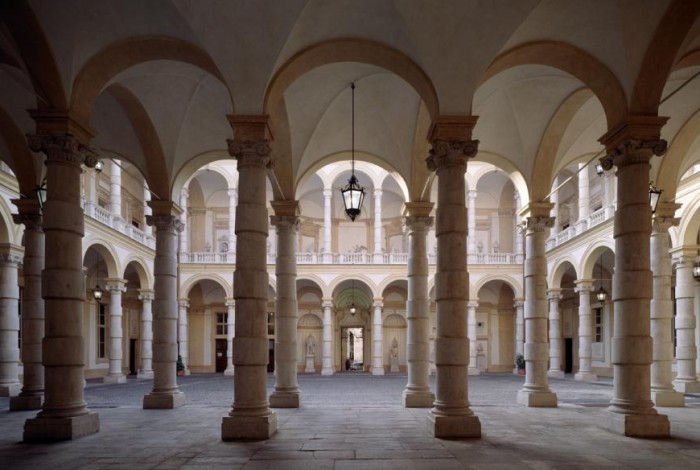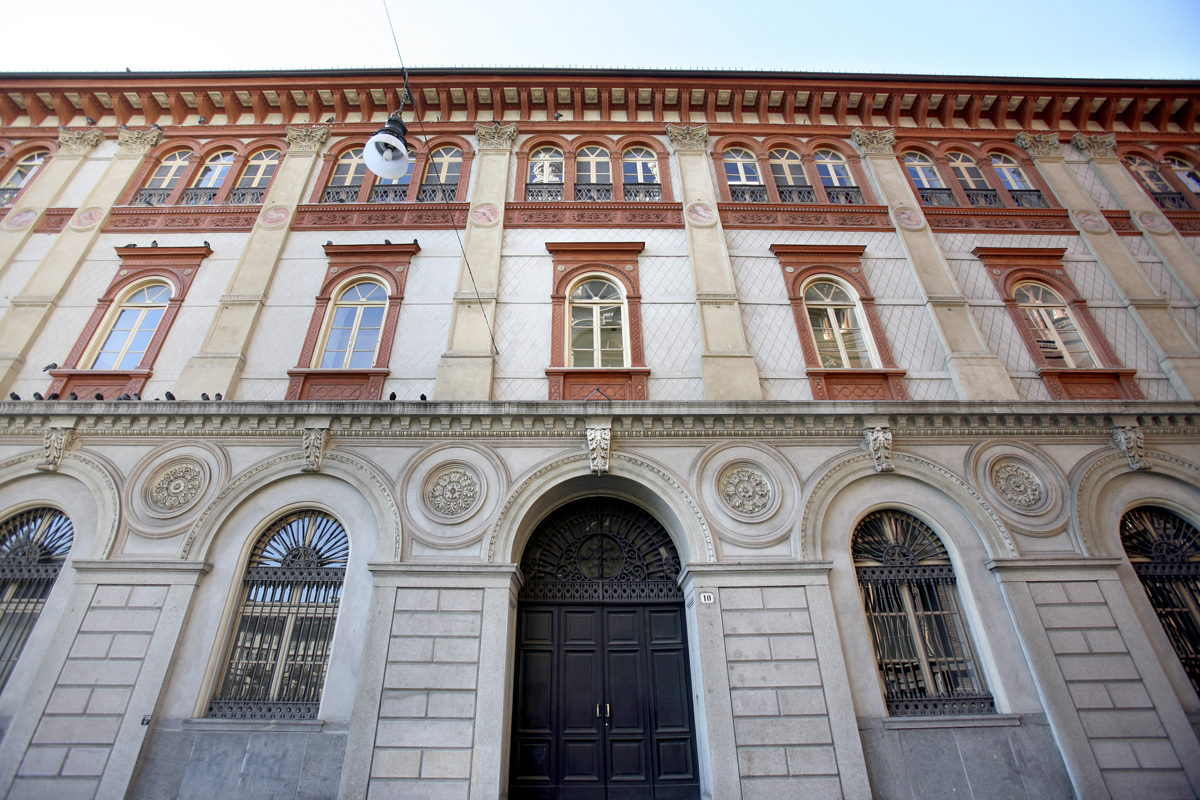News
Spring 2025 Newsletter
25 June 2025

Welcome to the Spring edition of Europa Ciceroniana’s Newsletter!
Every few months, our team will update you on the latest developments regarding our project. Of course, we will also look forward to upcoming events. Do you wish to receive these updates in your personal mailbox? Sign up using this form. Your address will not be shared or used for other purposes.
⏩ Looking ahead to the Turin meeting
 The second meeting of the Europa Ciceroniana project will take place this September!
The second meeting of the Europa Ciceroniana project will take place this September!
After a fruitful first meeting at the Université de la Sorbonne in January of 2025, the Università di Torino will host the second meeting from 25 to 27 September. Teachers, students and scholars will come together to once again discuss the Pro Archia, this time with special attention for two topics: actio and exile. You can also participate yourself: more on the Call for Theatre below.
Part of a rhetorician’s education was to have a keen awareness of body language, gestures and volume. These aspects were part of actio, or the delivery of the speech. In Turin, we will discuss what elements of the Pro Archia’s delivery we can reconstruct, and what effect this might have had on its audience.
Secondly, we will discuss the topic of exile. As a migrant, Archias’ status in Rome was precarious – his fight for citizenship that the Pro Archa describes is but one example. But migrants face many more challenges, both today and in antiquity. In Turin, we will invite speakers from outside the field of Classics to discuss what the Pro Archia can teach us about the difficulties faced by displaced people.
We also want you to participate during the Turin meeting! The organizational team has set out a Call for Theatre. We want to know how the Pro Archia inspires you, personally and when teaching. Have you written poems? Made drawings? Had your students stage a scene from the Pro Archia? We would love to see it!
🤝International working groups
The discussions during the Paris convention were extremely helpful in shaping the commentary and getting new ideas, so we decided to keep the team work going. In the weeks after Paris, middle school and high school teachers from participating countries, as well as teachers from French classes préparatoires, came together to share their remarks about the commentary and the website in the making.
Each group focused on one or two paragraphs, which they discuss in detail in regular online meetings and group chats. We also shared resources that members may have already been using and discuss them together so as to get inspiration for our own commentary.
We summarized the material we already had, made additions and sorted it between beginner-friendly and more advanced information Our approach is teaching-oriented, as we wish to shape the website into an immediately useful resource for all teachers and students, no matter their age, level or specific situation. This has led us to compare our teaching methods, as well as reflect on how our own students could concretely use the website in their studying.
We also discussed what the website should look like, and the design philosophy that would be most suitable. This reflection was mainly influenced by the diversity of our teaching cultures, which helped raise practical questions, such as the fact that some linguistics remarks might not be relevant for students in different countries.
The international groups are already directly contributing to the online commentary we aim to achieve by the end of the project, but they are also a wonderful way to keep in touch with other project members while eagerly wait to meet again in Italy in September!
🛜📺 Online meeting on Receptions of the Pro Archia, June 6th
On Friday, 6 June, about 25 project members and guests joined for an online meeting to reflect about the reception of Cicero’s Pro Archia. Videos of the lectures are available online.
The first speaker was Simone Mollea (Università di Torino, IT). He remarked that humanitas is a crucial expression in the Pro Archia. It has a double meaning, referring at the same time to an education in liberal arts and a spirit benevolent to knowledge. Dr. Mollea explained the history of the concept’s meaning and concluded his talk by arguing that the Pro Archia played an important role in the later humanist’s understanding of the Ciceronian notion of humanitas. Watch dr. Mollea's lecture here.
.png) In the second talk, Christoph Pieper (Leiden University, NL) told the participants about the Scholia Bobiensia, scholia on Cicero’s speeches which are now kept in Milan and the Vatican. The content of this short commentary probably dates back to the 2nd century CE; it was written for use in schools. After giving an overview of the contents of the scholia, dr. Pieper argued that it could be useful to incorporate the scholia in the commentary and in education in general, for example by having students compare modern and ancient commentaries. Watch dr. Pieper's lecture here.
In the second talk, Christoph Pieper (Leiden University, NL) told the participants about the Scholia Bobiensia, scholia on Cicero’s speeches which are now kept in Milan and the Vatican. The content of this short commentary probably dates back to the 2nd century CE; it was written for use in schools. After giving an overview of the contents of the scholia, dr. Pieper argued that it could be useful to incorporate the scholia in the commentary and in education in general, for example by having students compare modern and ancient commentaries. Watch dr. Pieper's lecture here.
The third talk, held by David Movrin (Univerza v Ljubljani, SL), dealt with an instance of reception of the Pro Archia in a work of the African American writer W.E.B. Du Bois (1868-1963). In his The Souls of Black Folk (1903), a collection of essays on African Americans’ life experiences in the US after the civil war, Du Bois describes employing arguments taken from the Pro Archia to convince unschooled African American farmers of the benefits of education for children, so that they send their young boys to school instead of making them work the field. In this way, dr. Movrin argued, Du Bois implicitly presented the African American boys as modern ‘Archiases’ who rightfully deserve American citizenship. Watch dr. Movrin's lecture here.
The workshop was concluded with questions and remarks from the audience, along with an insightful discussion about the possibility to include more instances of reception of the Pro Archia in our commentary, especially to engage more deeply with the aims of education today. The discussion will be continued during the workshop in Ljubljana in March 2026!
An update from the Italian National Group
The work of the Italian group continues with dedication and interest. On March 12, 2025, an initial online update meeting took place, during which the participants in the Paris meeting shared with their Italian colleagues the activities that had been carried out: in addition to commentary on the text, new ideas emerged as a result of the reflections of teachers from France, the Netherlands, Slovenia, and Italy. The goal is to create supplementary documents, interpretive readings of the text, and videos. The Italian teachers received this information with interest, and some of them expressed a desire to involve their high school students in the project by having them take part in the meeting on actio, which will be held in Turin from September 25 to 27, 2025!
The next meeting for the Italian group was scheduled for May 6, 2025. On that date, the Italian members will come together to define the next steps: organizing the completion of the commentary on the remaining paragraphs and determining the translation approaches and choices.
In the meantime, some Italian members continue to stay in touch with the international groups, in order to analyze the text from a broader perspective and ensure greater coherence in the work. We look forward to meeting—some again, some for the first time—our international colleagues in Turin!
🤖 First update on the commentary website
We are excited to announce that, while work on finalizing the input for the commentary is continuing at a steady pace at both the national and international level, the first steps towards creating an online format have been taken.
Our Dutch partner Websteen has been able to provide us with a ‘Work in Progress’-version of one of the paragraphs of the online commentary (see below for a sneak peek, for now only available with Dutch comments).
The commentary will be offered in a desktop and mobile version to best suit the needs of the students, for whom work and studying happens more and more from their phones. It will have to option of switching between comments on language, rhetoric and background of the paragraphs, will provide more in depth theme-pages about important topics of the speech and the opportunity to listen to how the paragraph is pronounced in Latin.
We are very excited about this first step that was taken and can’t wait to show you more!
